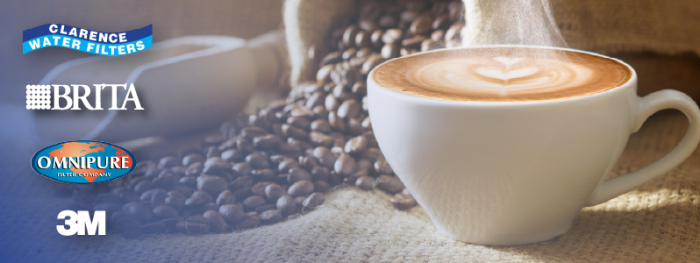Coffee Machine Water Filters
Clarence Water Filters is one of Australia’s premiere suppliers of coffee water filters and water filter systems.
We stock products from leading brands including 3M, Omnipure, Softerwater, UV Guard, and Pentair Everpure. Please browse our products below and if you have any questions, please get in touch.
New to coffee filtration? Read the introduction at the bottom of this page. Alternately, give us a call or shoot through an email for some friendly advice.
Showing 1–30 of 40 results
-
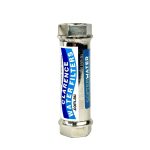 Hard Water
Hard WaterSofterWater™ Coffee Machine Water Softener
SofterWater™ ApplianceSoft – Coffee Machines is a Water Softener designed specifically for espresso coffee machines. Ideal for reducing scale build-up in your coffee machine, improving its performance, reliability, energy efficiency, and flavour extraction. Flow rates between 0.5 and 7 L/min.$184.00 – $191.60 Select options This product has multiple variants. The options may be chosen on the product pageSofterWater™ Coffee Machine Water Softener
SofterWater™ ApplianceSoft – Coffee Machines is a Water Softener designed specifically for espresso coffee machines. Ideal for reducing scale build-up in your coffee machine, improving its performance, reliability, energy efficiency, and flavour extraction. Flow rates between 0.5 and 7 L/min. -
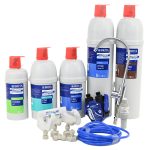
Brita Under Sink Filtered Drinking Water Systems
Brita Under Sink Drinking Water Filtration System with optional dedicated tap. Ideal for reducing chlorine, bad taste odour, and other impurities from your water. Filter options for scale reduction also… View Article$223.25 – $361.25 Select options This product has multiple variants. The options may be chosen on the product pageBrita Under Sink Filtered Drinking Water Systems
Brita Under Sink Drinking Water Filtration System with optional dedicated tap. Ideal for reducing chlorine, bad taste odour, and other impurities from your water. Filter options for scale reduction also… View Article -
Sale!
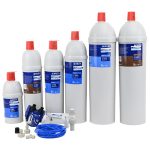 SALE!
SALE!Brita Espresso Coffee Machine Water Filter System
Cappuccino Espresso Coffee Machine Water Filter System. Designed to connect to your espresso coffee machine. Features a Brita Purity C cartridge filtration system for reduction of water hardness, chemicals, sediment, and bad taste/odour.$205.35 – $500.85 Select options This product has multiple variants. The options may be chosen on the product pageBrita Espresso Coffee Machine Water Filter System
Cappuccino Espresso Coffee Machine Water Filter System. Designed to connect to your espresso coffee machine. Features a Brita Purity C cartridge filtration system for reduction of water hardness, chemicals, sediment, and bad taste/odour. -

Brita Purity C Filter Head & Water Connect Kit with PLV
BRITA™️ Purity C filter water connection kit. This kit suits the Brita Purity C range of filters, including the: Quell ST Finest C1000 AC and Fresh Please Note: Will not… View Article$112.55 – $123.00 Select options This product has multiple variants. The options may be chosen on the product pageBrita Purity C Filter Head & Water Connect Kit with PLV
BRITA™️ Purity C filter water connection kit. This kit suits the Brita Purity C range of filters, including the: Quell ST Finest C1000 AC and Fresh Please Note: Will not… View Article -

Brita Purity C Head 0-70% 3/8″ BSP Male Threads
Brita Purity C Water Filter Head System ideal for coffee and espresso machines, vending machines and drinking water.Brita Purity C Head 0-70% 3/8″ BSP Male Threads
Brita Purity C Water Filter Head System ideal for coffee and espresso machines, vending machines and drinking water. -

Twin High Flow Scale-Reducing Food Service Water Filter Kit
A simple-to-install high flow unit capable of greatly improving water quality and protecting appliances.Twin High Flow Scale-Reducing Food Service Water Filter Kit
A simple-to-install high flow unit capable of greatly improving water quality and protecting appliances. -

Omnipure™ ELF Food Service & Coffee Machine Triple Action Water Filter Kit
Omnipure™ ELF Food Service & Coffee Machine Triple Action Water Filter & Head. Ideal for espresso coffee machines and food service applications. Includes Omnipure ELF water filter and Omnipure Head… View Article$130.50 – $150.40 Select options This product has multiple variants. The options may be chosen on the product pageOmnipure™ ELF Food Service & Coffee Machine Triple Action Water Filter Kit
Omnipure™ ELF Food Service & Coffee Machine Triple Action Water Filter & Head. Ideal for espresso coffee machines and food service applications. Includes Omnipure ELF water filter and Omnipure Head… View Article -
 Town Water
Town WaterUndersink Conversion Kit VH3-HC351
VH3-HC351+Head filter kit by 3M™ This conversion kit includes of a 3M™ VH3 filter head and 3M™ HC351-S. Used to replace older filters and systems that have been discontinued including:… View ArticleUndersink Conversion Kit VH3-HC351
VH3-HC351+Head filter kit by 3M™ This conversion kit includes of a 3M™ VH3 filter head and 3M™ HC351-S. Used to replace older filters and systems that have been discontinued including:… View Article -
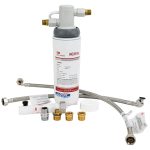 Town Water
Town Water3M HiFlow Under Sink Inline Water Filter System
The Quick change 3M™ filter cartridge filtration systems will reduce Chlorine taste odour, scale and other impurities from your water. High flow system designed to connect to standard mixer tap… View Article$150.00 – $289.00 Select options This product has multiple variants. The options may be chosen on the product page3M HiFlow Under Sink Inline Water Filter System
The Quick change 3M™ filter cartridge filtration systems will reduce Chlorine taste odour, scale and other impurities from your water. High flow system designed to connect to standard mixer tap… View Article -
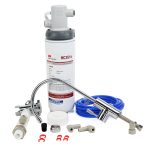 Town Water
Town Water3M Under Sink Filtered Drinking Water Systems
Quick change 3M™ filter cartridge filtration systems will reduce Chlorine taste odour, scale and other impurities from your water. The systems are very easy to install with most of the… View Article$239.00 – $399.80 Select options This product has multiple variants. The options may be chosen on the product page3M Under Sink Filtered Drinking Water Systems
Quick change 3M™ filter cartridge filtration systems will reduce Chlorine taste odour, scale and other impurities from your water. The systems are very easy to install with most of the… View Article -

Pentair MPRF RO on Demand Reverse Osmosis System
State of the art reverse osmosis purification system designed by Pentair. The new Pentair PRF-RO System features continuous-flow water production so a storage tank is no longer required. RO water on… View Article$1,500.00 – $1,645.00 Select options This product has multiple variants. The options may be chosen on the product pagePentair MPRF RO on Demand Reverse Osmosis System
State of the art reverse osmosis purification system designed by Pentair. The new Pentair PRF-RO System features continuous-flow water production so a storage tank is no longer required. RO water on… View Article -

Brita Purity C50 Quell ST Water Filter for Coffee & Vending Machines and Steam Ovens
The Purity Brita C50 Quell ST water filter is a compact water filter ideal for Drinking water, Coffee Machines, Vending Machines and Steam Ovens. Includes scale reduction.Brita Purity C50 Quell ST Water Filter for Coffee & Vending Machines and Steam Ovens
The Purity Brita C50 Quell ST water filter is a compact water filter ideal for Drinking water, Coffee Machines, Vending Machines and Steam Ovens. Includes scale reduction. -
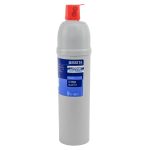
Brita Purity C150 Quell ST Water Filter for Coffee & Vending Machines and Steam Ovens
The Brita Purity C150 Quell ST quick change filter cartridge is ideal for filtration of coffee espresso machines and drinking water. Reduces sediment, bad taste/odour, and the carbonate hardness which causes scale.Brita Purity C150 Quell ST Water Filter for Coffee & Vending Machines and Steam Ovens
The Brita Purity C150 Quell ST quick change filter cartridge is ideal for filtration of coffee espresso machines and drinking water. Reduces sediment, bad taste/odour, and the carbonate hardness which causes scale. -

Brita Purity C150 Finest Water Filter for Coffee Machines
Brita Purity C150 Finest Water Filter for Coffee Machines. Reduces bad taste/odour, chemicals, sediment, and scale build-up. Protects your coffee machine and makes your brew taste great!Brita Purity C150 Finest Water Filter for Coffee Machines
Brita Purity C150 Finest Water Filter for Coffee Machines. Reduces bad taste/odour, chemicals, sediment, and scale build-up. Protects your coffee machine and makes your brew taste great! -

Brita Purity C500 Finest Water Filter for Coffee Machines
Brita Purity Finest C500 Brita quick change filter cartridge, ideal for Coffee and Espresso Machines. Reduces water hardness and Chlorine and other impurities Hard water areas for maximum protection of… View ArticleBrita Purity C500 Finest Water Filter for Coffee Machines
Brita Purity Finest C500 Brita quick change filter cartridge, ideal for Coffee and Espresso Machines. Reduces water hardness and Chlorine and other impurities Hard water areas for maximum protection of… View Article -

Brita Purity C500 Quell ST Water Filter
Purity C500 Quell ST Brita quick change filter cartridge Decarbonation filter. Ideal for Coffee & Expresso Machines Hot & Cold Vending Machines Combi Ovens & Conventional Ovens PURITY C Quell… View ArticleBrita Purity C500 Quell ST Water Filter
Purity C500 Quell ST Brita quick change filter cartridge Decarbonation filter. Ideal for Coffee & Expresso Machines Hot & Cold Vending Machines Combi Ovens & Conventional Ovens PURITY C Quell… View Article -

Brita Purity C300 Quell ST Water Filter
The Brita Purity C300 Quell ST is a large capacity filter which reduce sediment, chemicals, bad taste/odour, and scale build-up.Brita Purity C300 Quell ST Water Filter
The Brita Purity C300 Quell ST is a large capacity filter which reduce sediment, chemicals, bad taste/odour, and scale build-up. -

Brita Purity C1100 Finest Water Filter for Coffee Machines
Brita Purity C1100 Finest Water Filter for Coffee and Espresso Machines. Reduces sediment, chemicals, and hardness. High capacity model for offices and coffee shops.Brita Purity C1100 Finest Water Filter for Coffee Machines
Brita Purity C1100 Finest Water Filter for Coffee and Espresso Machines. Reduces sediment, chemicals, and hardness. High capacity model for offices and coffee shops. -

Brita Purity C1100 Quell ST Water Filter
Purity C1100 Quell ST Brita quick change filter cartridge Decarbonation filter. PURITY C Quell ST filter cartridges reduce the carbonate hardness in drinking water, thus preventing scale deposits in the… View ArticleBrita Purity C1100 Quell ST Water Filter
Purity C1100 Quell ST Brita quick change filter cartridge Decarbonation filter. PURITY C Quell ST filter cartridges reduce the carbonate hardness in drinking water, thus preventing scale deposits in the… View Article -
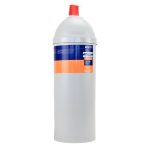
Brita Purity C1100 Steam Water Filter
Brita Purity C1100 Steam quick change filter cartridge decarbonation filter. Protects steam ovens from damaging scale build-up and improves their performance. The PURITY C Steam filter cartridges, has been specifically… View ArticleBrita Purity C1100 Steam Water Filter
Brita Purity C1100 Steam quick change filter cartridge decarbonation filter. Protects steam ovens from damaging scale build-up and improves their performance. The PURITY C Steam filter cartridges, has been specifically… View Article -

3M HF8-s Water Filter Part 5582113
The 3M™ HF8-S high flow cartridge provide high quality water by reducing effects of scale at flow rates up to 22.7lpm 3M™ water filter cartridges offers multiple solutions to improve… View Article3M HF8-s Water Filter Part 5582113
The 3M™ HF8-S high flow cartridge provide high quality water by reducing effects of scale at flow rates up to 22.7lpm 3M™ water filter cartridges offers multiple solutions to improve… View Article -
Sale!
 SALE!
SALE!3M HF15 MS Water Filter Part 56093 31
HF15 MS Food Service & Catering Equipment protection water filter for hardwater scale3M HF15 MS Water Filter Part 56093 31
HF15 MS Food Service & Catering Equipment protection water filter for hardwater scale -

HC351s 3M™ Cuno Scale Protection CC351 Filter
Genuine 3M™ CUNO HC351s Quick Change Filter. A high-quality filter designed to produce water that is delicious, clean, and safe to consume. HC351s Filters have Sediment Screen around a… View ArticleHC351s 3M™ Cuno Scale Protection CC351 Filter
Genuine 3M™ CUNO HC351s Quick Change Filter. A high-quality filter designed to produce water that is delicious, clean, and safe to consume. HC351s Filters have Sediment Screen around a… View Article -

3M HF25 S Water Filter AP9112 with Scale Reduction
HF25-S 3M part 5615203 Food Service & Catering Equipment protection water filter for Soft to Mid Range Total Hardness ppm. Is the ideal substitute for the AP9112, CWFAP 9112, C-Cyst-FF, Zip… View Article3M HF25 S Water Filter AP9112 with Scale Reduction
HF25-S 3M part 5615203 Food Service & Catering Equipment protection water filter for Soft to Mid Range Total Hardness ppm. Is the ideal substitute for the AP9112, CWFAP 9112, C-Cyst-FF, Zip… View Article -

3M HF27-S Food Service 5 Micron Sediment Chlorine and Scale Filter
HF27-S 3M filter for Food Service & Catering Equipment protection water filter for Soft to Mid Range Total Hardness ppm. Greater taste improvement for better tea and coffee etc.. 3M… View Article3M HF27-S Food Service 5 Micron Sediment Chlorine and Scale Filter
HF27-S 3M filter for Food Service & Catering Equipment protection water filter for Soft to Mid Range Total Hardness ppm. Greater taste improvement for better tea and coffee etc.. 3M… View Article -
Sale!
 SALE!
SALE!3M HF45-S Moffat MCF-19159 Triple Action Water Filter
Genuine 3M™ HF45-S Moffat MCF-19159 Triple Action Water Filter. The 3M™ Water Filtration Product Model HF45-S single cartridge water filter helps provide consistent high-quality water for espresso and coffee machines,… View Article3M HF45-S Moffat MCF-19159 Triple Action Water Filter
Genuine 3M™ HF45-S Moffat MCF-19159 Triple Action Water Filter. The 3M™ Water Filtration Product Model HF45-S single cartridge water filter helps provide consistent high-quality water for espresso and coffee machines,… View Article -

3M P124BN Triple Action Scale Control Filter
The 3M™ Water Filtration Product Model P-124BN single cartridge water filter helps provide consistent high quality water for espresso and espresso based drinks at flow rates up to 1.9 Lpm… View Article3M P124BN Triple Action Scale Control Filter
The 3M™ Water Filtration Product Model P-124BN single cartridge water filter helps provide consistent high quality water for espresso and espresso based drinks at flow rates up to 1.9 Lpm… View Article -

3M P-195BN Espresso Scale Control Filter 5633101
The 3M™ Water Filtration Product Model P-195BN part 5633101 Single cartridge water filter helps provide consistent high quality water for espresso and espresso based drinks at flow rates up to… View Article3M P-195BN Espresso Scale Control Filter 5633101
The 3M™ Water Filtration Product Model P-195BN part 5633101 Single cartridge water filter helps provide consistent high quality water for espresso and espresso based drinks at flow rates up to… View Article -

3M P-165BN Espresso Scale Control Filter
The 3M™ Water Filtration Product Model P165BN part 5615601 single cartridge water filter helps provide consistent high quality water for espresso and espresso based drinks at flow rates up to 3.8… View Article3M P-165BN Espresso Scale Control Filter
The 3M™ Water Filtration Product Model P165BN part 5615601 single cartridge water filter helps provide consistent high quality water for espresso and espresso based drinks at flow rates up to 3.8… View Article -

Omnipure SL10-C ALL Phosphate Scale Inhibitor In Line Filter
Omnipure SL10-C all Phosphate Scale Inhibitor in-line filter is a 100% phosphate filter to help reduce the amount of scale in the water lines. These filters are ideal for areas… View ArticleOmnipure SL10-C ALL Phosphate Scale Inhibitor In Line Filter
Omnipure SL10-C all Phosphate Scale Inhibitor in-line filter is a 100% phosphate filter to help reduce the amount of scale in the water lines. These filters are ideal for areas… View Article

Coffee Machine Water Filter Systems
Coffee machine water filters are speciality products designed to reduce contaminants which can impact the taste and odour of your coffee, or interfere with the coffee extraction process.
Coffee water filters will usually also contain media to remove or alter the form of dissolved minerals and salts in the water. This protects your coffee machine from scale build-up and/or corrosion.
Clarence Water Filters stocks a wide range of high-quality water filter systems ideal for Espresso Coffee machines.
Our coffee filtration systems give both professional and hobbyist baristas the best quality water that is necessary to make the perfect cup of coffee.
Read on to learn more or get in touch with us today for some friendly advice.
Why The Quality Of Your Water Matters
The quality of your water is critical when it comes to making a great-tasting coffee.
Why? Because water is the primary solvent in a cup of coffee, which makes it responsible for extracting the flavours and aromas from your favourite coffee bean.
Failing to use high-quality water can interfere with the extraction process or even worse, add unwanted contaminants which negatively impact flavour, aroma, acidity, or mouthfeel.
Nothing worse than a cup of coffee that reeks of chlorine or has unwanted sediment particles.
Using properly treated water also protects your coffee machine from scale build-up, abrasion damage, and corrosion.
Coffee filtration is particularly important if you have an expensive coffee machine working in a commercial operating environment.
Contact us to learn more about the coffee machine filter options that are available or continue reading.
Which Contaminants Are Most Detrimental For Coffee?
The contaminants of most concern are:
Chlorine and Chloramines
Municipal water authorities use chlorine and chloramines to disinfect the water supply. Unfortunately, it gives water a poor taste/odour which impacts brew quality. Use a filter containing carbon to correct this issue.
Sediment
Compounds That Affect Taste/Odour
Fortunately, carbon is usually very affective at removing compounds which have a negative flavour or odour.
Carbonate Hardness (General Hardness or Temporary Hardness)
Carbonate hardness refers to dissolved calcium and magnesium carbonates. When water is heated these minerals can precipitate from the water forming scale which can block up your espresso machines lines and coat the boiler. Limescale can KILL coffee machines.
Carbonate hardness is also referred to as ‘temporary’ hardness as it ‘leaves’ the water when you boil it. Treat using a filter that contains polyphosphate or ion exchange resin (softening resin). Water conditioners can also be used to reduce scale build-up.
Permanent Hardness (Non-carbonate hardness)
These components do not precipitate from water very easily and do not form scale. This type of hardness is often called ‘permanent hardness’ as these specific minerals and salts remain in a permanent dissolved state under normal conditions.
They do pose another risk though — in high levels, some minerals/salts can cause corrosion of metal and pitting of stainless steel boilers. Can be treated with mixed bed resin.
Total Hardness
Total Dissolved Solids (TDS)
TDS includes Total Hardness (Temporary Hardness + Permanent Hardness) and any other dissolved solids in the water. High levels of TDS can cause corrosion and pitting in stainless steel boilers. Can be treated with mixed bed resin.
Other Chemicals
Interested in learning more about how coffee machine filters remove contaminants?
Read our blog post Why Having A Coffee Machine Water Filter Is Essential.
The Importance of Retaining Mineral Content In Coffee Water
The risk of scale build-up and corrosion may make you think that removing all of the carbonate minerals — however, that is not ideal.
Removing 100% of the mineral content in your source water will result in a very flat tasting coffee without much character.
That’s why coffee filters aim for partial reduction of temporary and/or permanent hardness.
The goal is to set hardness at a level where your coffee still tastes great but scale build-up occurs at a much slower rate.
That’s the reason why manufacturers like Brita include adjustable filter heads in their Quell range, which allow you to limit the amount of water flowing through the ion exchange resin.
This lets you set the hardness at a point where your machine is protected, your coffee tastes great, and your filter has a decent lifespan.
FIltration Systems – Installation Types
Coffee filtration systems can be installed in several different ways. The most common options are:
- Plumbed In
The filtration unit send water directly to the coffee machine. This is the most common method for commercial and high end coffee machines, which typically have a 3/8″ water inlet connection on the machine. - Dedicated Tap
The filter system connects to a dedicated drinking water tap on the sink. This tap only produces filtered cold water. A great choice if your coffee machine has a fillable reservoir or you also want to use the filter system for drinking water. - High Flow
A high flow system is plumbed directly into your standard mixer tap using 1/2″ braided lines. All of the cold water coming out of the mixer will be filtered. Simple to install and affordable. The only down side of this type of unit is that it is typically unsuitable for ion resin exchange filtration and the filter media can be depleted faster as it is used every time the cold lever is turned on.
The Four Water Types
Brita defines coffee water in the following ways:
- Scale Water (High Carbonate Hardness)
- Gypsum Water (High Total Hardness)
- Soft Water (Low Hardness)
- Salty Water (High TDS/Total Hardness)
Here is a short run down on how to deal with each water type:
1. Scale Water
Description: Contains high levels of dissolved calcium, magnesium and hydrogen carbonates/bicarbonates. In high levels, these minerals can precipitate from the water when it is boiled, forming limescale.
Most parts of Queensland, South Australia, Western Australia, and Northern Territory have water with high carbonate levels. Some parts of Western NSW can also have high carbonate water.
Effect: Scale will form, which coats your heating element and internal water pipes. Can cause blockages and damage. Also impairs coffee production as your boiler may struggle to reach ideal temperature for extraction.
Solution:|
For low carbonate hardness: Filter with Carbon + Polyphosphate.
For medium carbonate hardness: Filter with Carbon + Softening Resin (Cation resin).
For high carbonate hardness: Filter with Carbon + Mixed Bed Resin (Anion + Cation resin).
Filter systems:
Systems using Ion Exchange Resin:
- Brita Under Sink Filtered Drinking Water Systems (Dedicated tap)
- Brita Cappuccino Espresso Coffee Machine Water Filter System (Plumbed In)
Systems using polyphosphate:
- 3M Under Sink Filtered Drinking Water Systems (Dedicated Tap)
- 3M HiFlow Under Sink Inline Water Filter System (High flow)
- Twin High Flow Scale-Reducing Food Service Water Filter Kit (High Flow)
2. Gypsum Water
Description: Contains high levels of calcium, magnesium and sulphate minerals (High Total Hardness)
Effect: Causes white chalky gypsum deposits on the machine. Can negatively affect the flavour and mouthfeel of your coffee. Very high total hardness with high alkalinity can be corrosive.
Solution: For Total Hardness, filter with Carbon + Mixed Bed Resin (Cation and Anion resin) is suitable. Polyphopshate is less effective on water with high total hardness. If using a Brita system, choose from the Finest filter range as it reduces total hardness.
Filters Systems:
Systems using Ion Exchange Resin:
- Brita Under Sink Filtered Drinking Water System with Brita Finest (Dedicated Tap)
- Brita Cappuccino Espresso Coffee Machine Water Filter System with Brita Finest (Plumbed In)
3. Soft Water
Description: Contains low levels of calcium, magnesium and gypsum.
Effect: The mineral level in soft water will have a limited impact in terms of scale build-up and corrosion. However, filtration is still required to remove sediment, chemicals, and bad taste/odour from the water.
Solution: Carbon filtration is still a must. Polyphosphate or a softening resin is recommended, particularly in high volume situations or when using an expensive espresso machine.
Filter Systems:
Systems using Ion Exchange Resin:
- Brita Under Sink Filtered Drinking Water Systems (Dedicated tap)
- Brita Cappuccino Espresso Coffee Machine Water Filter System (Plumbed In)
Systems using polyphosphate:
- 3M Under Sink Filtered Drinking Water Systems (Dedicated Tap)
- 3M HiFlow Under Sink Inline Water Filter System (High flow)
- Twin High Flow Scale-Reducing Food Service Water Filter Kit (High Flow)
Systems without scale reduction (sediment/chemical reduction only, soft water areas):
- Twin Under Sink Water Filter Systems (Dedicated Tap)
- Single Bench Top Water Filters (Bench Top)
4. Salty Water
Description: Salty water has high levels of chlorides and sulphates.
Effect: Can negatively impact flavour by making your coffee taste salty. Can also cause damage to metal surfaces, including corrosion and pitting of stainless steel boilers.
Solution:
Filter with Carbon + Mixed Bed Resin (Cation and Anion resin).
If very little carbonate hardness is present, Carbon + Anion resin could be used.
Filters:
What is The Ideal Water For Coffee?
According to Speciality Coffee Association (SCA) the ideal water for brewing espresso coffee has the following qualities:
| Characteristic | Target | Acceptable Range |
| Odour | Clean Fresh / Odour Free | |
| Chlorine | None | None |
| Calcium Hardness | 50-175 ppm CaCO3 | 50-175 ppm CaCO3 |
| Alkalinity | 40 ppm | At or near 40-70 ppm |
| pH | 7 | 6-8 |
| TDS | 150 mg/L | 75 to 250 mg/L |
Proper filtration can help your water reach these levels, dramatically improving the quality of your espresso coffee.
It’s important to note that the ideal water does contain some hardness. That’s because calcium and magnesium carbonates will add brightness to your coffee. Pulling all of the hardness out can result in a cup of coffee that is dull and lifeless.
Catering Equipment Filtration
We also have filters that are designed to protect domestic and commercial catering equipment like:
- Ice makers
- Dishwashers
- Glass Cleaners
- Beverage dispensers
- Convection Steam and Combi ovens
Protects appliances used in the Home, Cafes, Bars, Pubs, Clubs and the Hospitality industries.
Coffee Machine Water Filters — Our Brands
We work in partnership with the world’s best coffee machine water filter manufacturers including:
- 3M
- Brita
- Everpure
- BWT
- Omnipure
- Pentair
We also stock filter housings which are compatible with standard 10″ and 20″ Double Open Ended filters. They can take a wide range of filters, including sediment, chemical and scale reducing filters.
Benefits of Filtering Your Coffee Machine Water
Improved Taste and Odour
This is the main benefit of coffee water filtration. A coffee water filter reduces a wide range of contaminants including sediment, chlorine, chloramines, and other compounds which impart a bad taste/odour on water.
Reducing these contaminants leaves you with clean, pure water which is much better at extracting flavour from coffee beans. The flavour of your coffee beans is also more apparent when other negative flavours have been removed.
Filtered water produces a more consistent coffee flavour, which is useful when you are trying to refine your brew and get the best from your coffee beans.
Health Benefits
Coffee machine filters reduce many different chemicals — including some nasty chemicals which have been proven to be dangerous to human health. This includes trihalomethanes, cafestol, kahweol, halonitrils, halonitromethanes (chloropicrin) and more.
Improved Coffee Machine Lifespan and Reliability
Coffee machine water filters will contain mechanical filtration and filter media specifically designed to protect coffee machines.
This can include:
- Sediment protection to remove particles that can cause abrasion damage to your coffee machine
- Carbon media which reduce chemicals and bad taste/odour
- Polyphosphate which sequesters calcium molecules that can cause limescale development
- Ion exchange resin which removes minerals to protect your coffee machine against limescale and corrosion
Protecting your coffee machine using filtered water will increase its lifespan and make it more reliable. You will be less likely to experience unexpected breakdowns and associated repair costs.
Improved Consistency
Using filtered water gives you a stable platform to work from. Every time you fill your machine, you know that the coffee will have a predictable quality about it, as the filter will be reducing contaminants to a certain degree.
If the local water authority decides to dose the water harder with chlorine or the water is dirtier due to bad weather, the filter will still correct it and give you water of a similar quality.
Having a reliable water supply helps you refine and improve your coffee. Essential for coffee lovers interested in making a great brew.
Improved Extraction
Filtered water has less impurities in it, which makes it a better solvent. This means it will extract more flavour and aroma from your coffee beans.
Frequently Asked Questions
How Do Water Filters Improve the Taste and Odour of Coffee?
Sediment filters will help by removing particulates which may impact mouth feel, flavour and odour. This can include contaminants like rust, dirt, sand, metal particles, silt, and algae.
Carbon filters help in two ways. The first is the reduction of chemical contaminants like chlorine and chloramines. These contaminants affect both the taste and odour of your brew,
The second way carbon filtration helps is by enhancing your water’s ability to extract flavours and aromas from the coffee bean itself. That’s because clean water is more effective at extraction.
Ion Exchange Resin reduces scale build-up in your coffee machine by removing dissolved minerals/salts and replacing them with an inert molecule. of some type. This reduces the risk of scale build-up from excessive calcium/magnesium carbonates or corrosion due to high total hardness. (Best option for moderate-high hardness or for stainless steel boilers)
Polyphopshate reduces scale build-up by sequestering dissolved calcium and magnesium carbonates. Ideal for soft and slightly hard water types.
Water conditioners change the form of dissolved minerals, so they are less likely to attach to form scale.
It’s worth noting that many coffee filters will use several types of filtration in a single cartridge. The Brita Purity C 150 Finest for example, has sediment, carbon, and resin filtration in a single unit.
What Is Limescale and Why Is It Dangerous To Coffee Machines?
When dissolved calcium and magnesium carbonates precipitate from the water, they create a hard crust called limescale.
Limescale is especially dangerous in coffee machines, as it can coat the heating element in your boiler and clog up the thin lines that carry hot water and steam.
At the very least, scale build-up can impair the performance of your coffee machine and impair its ability to extract flavour from the coffee beans. It will also cause your coffee machine boiler to turn on more often as it tries to maintain temperature – increasing energy consumption.
In the worst case scenario, scale build-up will completely clog internal lines or damage the boiler permanently — leading to expensive repairs or the destruction of your beloved coffee machine.
What Is Hardness?
Carbonate Hardness (Temporary Hardness)
Primarily refers to calcium and magnesium carbonates/bicarbonates. Often referred to as “temporary hardness” as these minerals will precipitate from the water over time – creating hard limescale deposits.
Carbonate hardness leaves the water faster when the water is heated. This makes it particularly concerning for espresso coffee machines, which have an on/off heating cycle.
It’s important to note that calcium and magnesium plays an important role in adding flavour to coffee. These minerals make a cup of coffee taste brighter, so it is important to maintain some level of mineral carbonates in the water.
Carbonate hardness is usually the most important form of hardness to consider as scale is a significant issue.
Permanent Hardness
This term is used to describe the minerals which remain in the water after it is boiled, including chlorides and sulfates. Although these minerals won’t create scale, they can cause other problems like pitting of stainless steel and general corrosion (in high levels).
Total Hardness
The combination of temporary and permanent hardness.
What Is TDS?
High TDS levels can be very alkaline and corrosive. High TDS water is also more likely to be scale-forming as it will contain high levels of calcium/magnesium carbonates. The chlorides found in high TDS water can also cause pitting in stainless steel boilers.
Low TDS water (below 50 ppm) can also be corrosive as it becomes be more acidic. It can attack metal and leach contaminants from the surfaces it touches.
The ideal TDS level for making coffee is about 150mg/L.
How Does Polyphosphate Reduce Scale?
It is also capable of gradually stripping existing scale from the lines within your coffee machine, which is useful for older machines.
Polyphopshate is best used in situations where you have low to moderate hardness. It can be used on both domestic and commercial operating environments.
If you have moderate to high hardness, high TDS, or a stainless steel boiler, it is often wiser to use resin, as it is capable of greater hardness reduction and can also remove non-carbonate hardness.
How Does Ion Exchange Resin Reduce Scale and TDS?
Ion Exchange Resin consists of resin or plastic polymeric beads, which hold an ion with a negative or positive charge (usually hydrogen or sodium). When water flows through the resin, contaminant ions are exchanged for the hydrogen or sodium in the resin.
Cation resins have a negative charge so will attract and remove positively charged ions like dissolved Calcium Carbonates. This type of resin is often referred to as a softening resin. It will remove most scale build-up.
Anion resins have a positive charge so will attract and remove contaminants with a negative charge including chlorides and fluorides. Although most anion resins won’t contribute to scale build-up, they can cause corrosion or metal pitting in high levels.
A mixed bed resin will contain both anion and cation resin, so it can remove all total dissolved solids. This is a useful approach for very hard water or coffee machines with stainless steel boilers, as high levels of chlorides can damage metal surfaces.
Do I Need a Water Filter For My Coffee Machine?
If you have an expensive espresso machine, then yes, you should also use a coffee machine water filter. The right filter will protect your coffee machine from abrasion damage from sediment, from scale build-up, and from corrosion of metal surfaces.
If you have a cafe, then yes, filtration is essential. It will improve the quality of your product, keeping your customers happy. It will also ensure your expensive commercial coffee machines remains protected from damage.
Will I Still Need To Descale My Coffee Machine?
Filters containing media like polyphosphate and ion exchange resin are designed to significantly reduce scale build-up. However, they are not designed to completely eliminate the minerals that can form scale. If you did completely remove those scale-forming minerals, your coffee would taste terrible.
For this reason, we still recommend routine de-scaling. This is particularly true if you are in an area with very hard water, like South Australia, Western Australia or Northern Queensland.
How Long Will A Coffee Machine Water Filter Last?
- Water quality (hardness, chlorine levels, sediment levels)
- Usage (how many cups are you making per day, is it a commercial kitchen or private residence)
- Size of filter (large filters tend to have more contaminant reduction capacity)
In most cases, the scale reduction media is the main factor that determines lifespan. You are much more likely to deplete than have the filter clog up from sediment or reach chemical adsorption capacity.
Most filter manufacturers will specify the number of litres of scale reduction capacity on their filter specifications. For some higher end filters, like the Brita products, they will have specifications which show filter hardness reduction capacities at different hardness levels.


